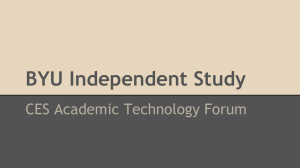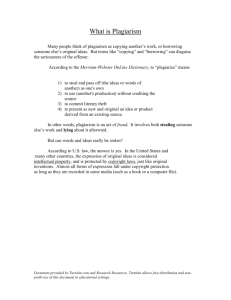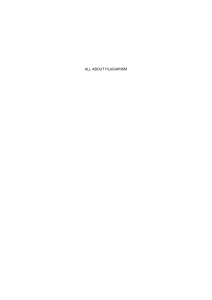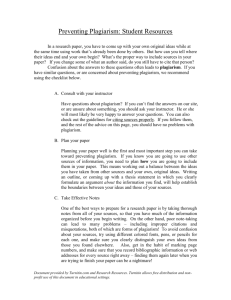Academic integrity
advertisement
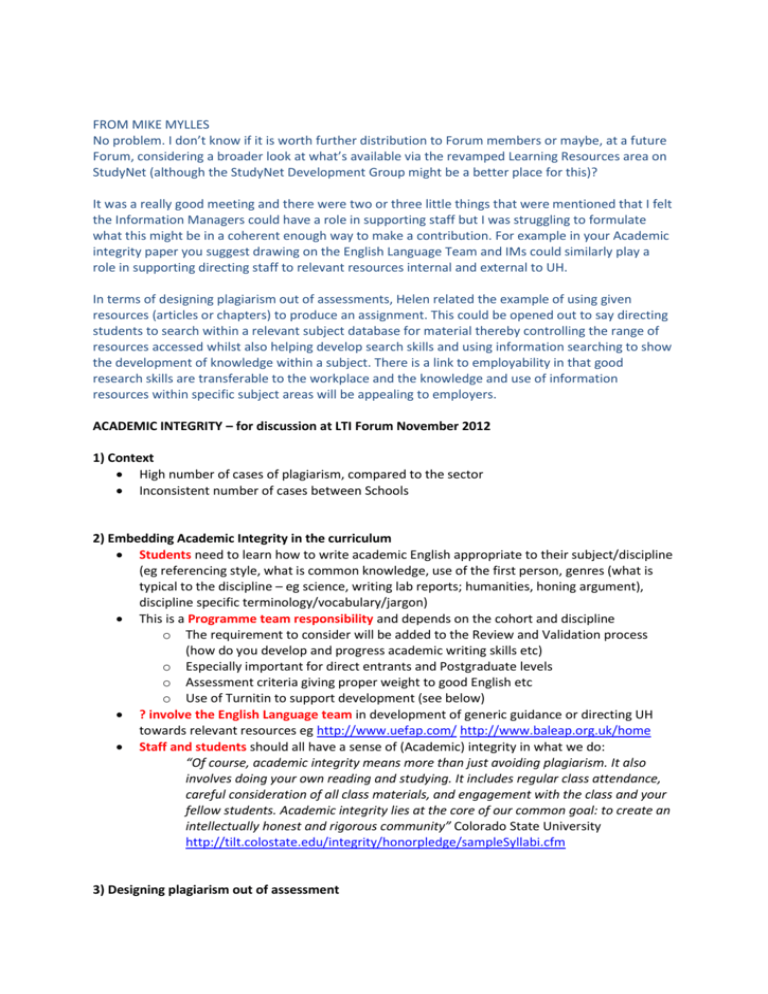
FROM MIKE MYLLES No problem. I don’t know if it is worth further distribution to Forum members or maybe, at a future Forum, considering a broader look at what’s available via the revamped Learning Resources area on StudyNet (although the StudyNet Development Group might be a better place for this)? It was a really good meeting and there were two or three little things that were mentioned that I felt the Information Managers could have a role in supporting staff but I was struggling to formulate what this might be in a coherent enough way to make a contribution. For example in your Academic integrity paper you suggest drawing on the English Language Team and IMs could similarly play a role in supporting directing staff to relevant resources internal and external to UH. In terms of designing plagiarism out of assessments, Helen related the example of using given resources (articles or chapters) to produce an assignment. This could be opened out to say directing students to search within a relevant subject database for material thereby controlling the range of resources accessed whilst also helping develop search skills and using information searching to show the development of knowledge within a subject. There is a link to employability in that good research skills are transferable to the workplace and the knowledge and use of information resources within specific subject areas will be appealing to employers. ACADEMIC INTEGRITY – for discussion at LTI Forum November 2012 1) Context High number of cases of plagiarism, compared to the sector Inconsistent number of cases between Schools 2) Embedding Academic Integrity in the curriculum Students need to learn how to write academic English appropriate to their subject/discipline (eg referencing style, what is common knowledge, use of the first person, genres (what is typical to the discipline – eg science, writing lab reports; humanities, honing argument), discipline specific terminology/vocabulary/jargon) This is a Programme team responsibility and depends on the cohort and discipline o The requirement to consider will be added to the Review and Validation process (how do you develop and progress academic writing skills etc) o Especially important for direct entrants and Postgraduate levels o Assessment criteria giving proper weight to good English etc o Use of Turnitin to support development (see below) ? involve the English Language team in development of generic guidance or directing UH towards relevant resources eg http://www.uefap.com/ http://www.baleap.org.uk/home Staff and students should all have a sense of (Academic) integrity in what we do: “Of course, academic integrity means more than just avoiding plagiarism. It also involves doing your own reading and studying. It includes regular class attendance, careful consideration of all class materials, and engagement with the class and your fellow students. Academic integrity lies at the core of our common goal: to create an intellectually honest and rigorous community” Colorado State University http://tilt.colostate.edu/integrity/honorpledge/sampleSyllabi.cfm 3) Designing plagiarism out of assessment The LTI to further develop guidance on good practice The LTI to embed in discussions about assessment design eg Vary assessments each year Question design – eg not leading to regurgitation of well-known facts or arguments Tracking mechanisms – know your students and their work Assess process, not just product Assessment criteria PLAGIARISM and ACADEMIC MISCONDUCT 1) Whilst there is disciplinary variation in what constitutes plagiarism, there needs to be: Consistency in the treatment of breaches of Assessment regulations Consistency as to when breaches are branded Academic misconduct 2) The Associate Deans AQA (and SACOs) user group on assessment offences meetings: October, February and May 2012/13 Work towards a common understanding of breaches and the tipping point for misconduct Ensure this is reflected in guidance on the CAQA website The Associate Deans AQA and SACOs to lead the dissemination of that understanding across their Schools Would be useful for a member of LTI to join this group TURNITIN 1) Its use in supporting the development of Academic Integrity (helping students evaluate their work) depends on the School/programme team Multiple submissions by students are no longer an option (no ‘wormhole’, stops repeated submissions that are focussed on the similarity percentage rather than good writing) Guidance for students on submitting a draft to Turnitin is included within StudyNet (?) School/programme teams need to contextualise for students the implications of the report for developing their work. Associate Deans and SACOs could help the development of the guidance. The English Language team may be a useful group to involve. 2) Its role in detecting or providing evidence of plagiarism Associate Deans (AQA) (and SACOs) should take the lead on advising UH on policy and its development - this is considered at the Assessment Offences user group Generic guidance on understanding Turnitin reports should be made available on the CAQA website eg http://turnitin.com/en_us/products/originalitycheck A distinction needs to be drawn between a ‘similarity percentage’ and a judgement of plagiarism. Turnitin is text matching software, not plagiarism detection software Associate Deans (AQA) (and SACOs) may want to develop School level guidance on interpreting and making judgements about plagiarism and misconduct and the relevant penalties , 3) Other staff development relating to the use of Turnitin Using Turnitin in StudyNet – Camtasia/written resources LTI/IH – drawing on Karen Robins’ experience QUESTIONS FOR THE FORUM Is this an accurate reflection of the situation? Are the people identified as responsible the correct people? Are there gaps/is anything else needed/does anyone else need to be involved?
